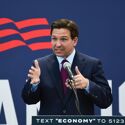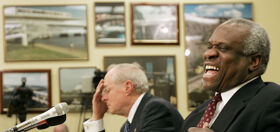
Oregon-born Aaron Jensen has dedicated the past seven years of his life to the Department of State. Despite his dedication, our government still refuses to grant Jensen and other gay employees the same benefits offered to straight officials. The unspoken discrimination made big headlines last year when former Romanian Ambassador Michael Guest blasted Condoleezza Rice and others for their inaction on gay equality.
Jensen hopes that he won’t have to do the same. That’s why he heads up the 400-strong Gays and Lesbians in Foreign Affairs Agencies, which strives to revamp the Department’s employment policies. Our editor recently sat down with Jensen to talk shop. The results are intriguing, particularly because Jensen – who spoke in fairly calm, nearly monotonous tones – attempts to toe the line while also advocating for gay rights. It’s an odd combination, to be sure, but not surprising considering the circumstances.
Andrew Belonsky: First, what exactly is your role – what’s your job?
Aaron Jensen: My job job?
AB: Yeah.
AJ: I’m a desk officer for the State Department, but I’m not going to focus or really talk about my professional job.
AB: Okay… So you work for the State Department. Why did you decide to work there?
AJ: It’s what I always wanted to do – since about college. It sounded really great – a diplomatic corp that goes around representing the United States’ interests to various countries in the world. You really get to know what it’s like to live and work in a foreign country.
AB: And where have you traveled?
AJ: Guanjo, China, Madrid, Spain and Kabul, Afghanistan.
AB: How many languages do you speak?
AJ: Really just Spanish and Chinese.
AB: Afghanistan must have been a struggle, must have been a challenge.
AJ: Yeah, it was a challenge. I didn’t speak the local language, so I relied on translators when I dealt with Afghans who didn’t speak English. The main challenge, I would say, was social. The work was super exciting – you worked long hours, but people work long hours here.
AB: What do you mean “social challenges”? Because you were working all the time?
AJ: No. For security reasons your social group is primarily the people you live and work with.
AB: Tell me about your work with Gays and Lesbians in Foreign Affairs Agencies.
AJ: I’m the president of the organization presently – until March.
AB: How long are your terms?
AJ: One year. I have an opportunity to go abroad – I thought I would stay another couple years, but I’m going to go abroad. But [GLIFAA is] a department recognized employee affinity group, [whose] main responsibility is advocating for gay and lesbian issues in the State Department. Our priority is trying to get equality in benefits for gay and lesbian employees and equality in benefits for families of gay and lesbian employees.
AB: You’re “department recognized”. What is your relationship with the State Department. Is it just that they respect you? That’s the “recognition”?
AJ: There are – let’s see – we are considered to be the equivalent to Blacks in Government or the State… We don’t get a budget from the department, but it’s recognized that we can meet occassionally with state officials, if they so choose.
AB: Do you guys have regular meetings with officials or is it case-by-case?
AJ: It had been case-by-case, but the director general, the head of human resources, basically – he’s going to meet quarterly with all affinity groups. We also have members from the US Agency for International Development, the Foreign Agricultural Service and the Foreign Commercial Service…
AB: Do you get involved in international advocacy?
AJ: Never.
AB: You’re primarily concerned with employee equality, but are there other issues with which you engage, make statements?
AJ: Almost never. Never. Never, ever, ever do we advocate on U.S. foreign policy. No. That’s not our purview. Just advocacy for State employees.
AB: And that’s an internal decision?
AJ: Yes. We do have speakers from various international GLBT organizations, but we ourselves do not speak out publicly on any foreign policy issues.

AB: I recently interviewed someone who also lives in Washington. He talked about a culture of homophobia in Washington. Do you get that impression?
AJ: “A culture of homophobia in Washington”… I don’t get that impression. I think it’s hard to have an impression and compare it to reality when you’re part of a community, but to me [DC] seems like a gay place.
AB: Even within the government corridors?
AJ: Yeah. I mean, if the person you were in the military, of course it’s a different story.
AB: No.
AJ: I don’t think there’s a great deal of homophobia in the government. No more than there would be anywhere else in America. And I would say DC probably has less homophobia than your average American city or space. Someone could say, “Well, New York or Chicago,” for instance, but I’m sure it’s probably a more tolerant area than the Chicago population as a whole. And probably the New York population as a whole – if you get out of Manhattan.
AB: Interesting… So, one thing that I’m very intrigued by is the “Member of Household”. Can you explain to the reader what that is…
AJ: I will try. The Member of Household is a category that – you have to refer to another activist to say when it started – but Members of Household include gay and lesbian partners, some elderly parents, some adult children. They are a different category than the official category for a spouse and children, which is “Eligible Family Member” – EFM. So a Member of Household would be a family that doesn’t fit into the EFM category and we are trying to advocate for the inclusion of Members of Household. We want Members of Household to have the same benefits as EFM.
AB: Do you –
AJ: I mean, it’s a bureaucratic concept.
AB: Let’s talk about the parameters of MOH. I’m looking at this article in Foreign Service Journal from June of 2004 by Bob Guldin. He’s talking about some of the things that Members of Household can and cannot do – they’re mostly cannot. They can’t take security overseas seminars, they can’t attend the language training… What is this? What is the state department’s rationale for that?
AJ: Because for many of those – well, language and security overseas seminars? That’s a harder one. They could possibly make some changes and administratively allow those, but the majority of serious benefits come directly from the Foreign Service Act of 1980. That [defined] eligible family members and their benefits. I’d say that 60-80% of what we [want] would probably require some legislative fix. Although, I think that language and security overseas seminars – they could somehow make a administrative change and I don’t know their rationale for not doing that. I actually don’t know.
AB: So there are two levels to your struggle – you have to deal with the administrative red tape, the process and then you also have to worry about Congress.
AJ: Yes.
AB: That must create a sticky situation for you sometimes.
AJ: Yeah, we have to be careful with Congress. We can speak solely on our issues and not on foreign policy. We just have to careful, because administration employees are not to lobby, but we can answer questions and provide information.
AB: So you guys – gay or straight – you can’t lobby. Can you make political donations?
AJ: Yes, but we cannot declare that we work for the U.S. government when doing so, nor during campaign season. If somebody asks me what my job is, I can’t say.
AB: Is that the same for all federal bureaus?
AJ: I believe so, yes.

This Michael Guest, in case you didn’t know…
AB: Do the current restrictions compromise America? Both with regard to physical security and the democratic ideals – liberal democratic ideals?
AJ: I can’t say anything on physical security. That would be hard to argue. Democratic ideals? If one of those ideals is equality – same pay for same work, giving all of your employees the same benefits – then absolutely. One could make the argument that you lose some employees who would be good for American security or the government, but they choose not to enter the foreign service because they can’t get any support for their partners.
AB: That’s what we saw with Michael Guest, who I imagine you know because he was the ambassador to Romania and you just answered the phone, “Romania desk”.
AJ: I did answer the phone, yes, but I didn’t know him in that capacity. I know him socially and through GLIFAA.
AB: What was the feeling both within the GLIFAA and within the office after that happened? Was this something that people talked about or was this just another news blip?
AJ: His resignation did capture the attention of folks in GLIFAA, certainly, because he helped us. He really was a benefactor very much for the organization. He encouraged us to be outgoing and forward and pressing. In my office? Nothing. Well, it did make the daily press feed and it was noticed in the Romanian press, but I think that the main place it was noticed was on Capitol Hill.
AB: Among the politicians?
AJ: Yes, congress folk. It definitely caught the interest of the majority in Congress, the House Foreign Affairs Committee.
AB: Do you consider your organization to be effective? I understand you’ve been petitioning against Members of Household for quite some time and to no avail. That’s something that Michael Guest mentioned in his retirement speech: “For the past three years, I’ve urged the Secretary and her senior management team to redress policies that discriminate against gay and lesbian employees. Absolutely nothing has resulted from this.”
AJ: Yeah, okay. It’s a fair question: “What are you guys doing?” And in the current circumstance, I think, as in anything, change doesn’t come overnight. You have to constantly remind people, “We’re here, there’s an issue!” But we can’t make the State Department management make our issues a priority. Clearly they have not treated issues of equality for gays and lesbians as an issue of priority. Unless someone is advocating, they’re not going to bother at all.
AB: Okay.
AJ: I would say in the last few years we have, the last year, our board has tried to be more effective. Having Mike as a benefactor certainly helped. The press of his resignation certainly helped, but I would hope that we wouldn’t have to have a rash of resignations to make continuous press. The fact that he served as an ambassador and was a skilled foreign service officer was noted when he was departing, but this is a conservative organization. As much you might think that the average employee here is not conservative, it –
AB: You mean the State Department?
AJ: Yes. The organization itself is extremely slow to change. They remind you of things like the first time a woman could be married in the foreign service was 1978 or 1980, I don’t remember which – I don’t really care. That’s not my issue. But it shows you how slow it is to change.
AB: Maybe that’s what my previous subject meant when he spoke of “homophobia”. Maybe he meant that Washington is dated in some of its ideals.
AJ: It might be. They’ll ask you questions, “How much will this cost?” I’m like, “I don’t care how much it costs,” but you can’t say that. You can ask, “How do you define a partner?” And you can give suggestions. I mean, it’s all from a bureaucratic standpoint – “How much will this cost? How will it be enforced?
AB: What I found most telling about the Michael Guest story – and stories before that – is that Condoleezza Rice, nor anybody else in the State Department – no one that I know of – has even dignified the criticism with a response. The silence is really deafening.
AJ: Yeah, well… It’s not a priority. That’s the reality.
AB: What’s your organization’s budget?
AJ: I’m not going to publish that – it’s enough for outreach issues, enough to put out a newsletter, have a website and social influence…
AB: When you say “outreach” – what sort of outreach do you mean?
AJ: Communicating with other gay organizations in DC, speakers on international gay and lesbian issues. We’re trying to do more outreach in this next year with more folks in Washington.
AB: Do you work closely with other LGBT organizations in Washington?
AJ: We have not. We probably should. I mean, we worked – we have communicated with the HRC on the Domestic Partnership Benefits and Obligations Act, which was introduced by Gordon Smith of Oregon and Joe Lieberman of Connecticut. We worked with them to make sure the text contained language that would help the foreign service, because we’re under a different set of laws than most of the federal employees.
AB: Are you hopeful that you guys will be successful?
AJ: Oh, I do think so. I think it’s one of these things that gays and lesbians think that overtime things will happen, but I’m not sure we’re going benefits any faster than anyone else in the government, but a change next term could effect – I personally can’t say I trust any of the candidates to be that much more active in our issues.
AB: So, you would not dissuade a young gay man or gay woman from joining the foreign services?
AJ: No, especially if they’re single. But I would warn them that if they have a partner – whatever that means to any of us – you guys are going to have to work out all your expenses on your own.



















Steven
Excellent interview, I had no idea State department employees faced such different rules and regulations when compared with Army civilians.
yalesing
indignant,face such a unfair rules with discrimination towards gay service in army,i am a gay and my profile is on gaysinglehunt.com where i look for gay partner
chandler in lasvegas
It is good to know that wherever we are, we can make our presence felt. It is unfortunate that this group of 400 can only publicly state that they are gay and wish to be treated equally. It is a presence, but they cannot make it felt. I am glad that they do what they are ALLOWED to do. More power to them in the next administration.
ProfessorVP
Those who say Condoleeza Rice’s sexual orientation is nobody’s business need to wake up and smell the frappucino. Yes, until discrimination in her department ends, it is everyobody’s business.